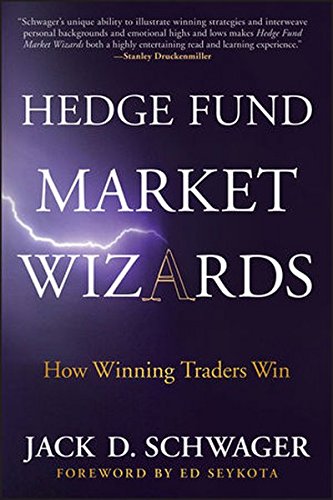Review: – Disclaimer: the German version comes as a trilogy, and I only read the first book about macro strategists, so technically this review only applies to one third of Hedge Fund Market Wizards. – Trading is easy now. Hundreds of online brokers and trading systems contend for your attention. Each one offers lower transaction fees, more professional analysis tools, better training videos and access to more exotic underlyings than the next. Trading consistently successful, however, is actually pretty hard. Like its predecessors (Market Wizards, New Market Wizards, and Stock Market Wizards), Hedge Fund Market Wizards, contains a series of interviews with successful traders. Author Jack Schwager, himself a recognized trading expert and fund manager, sat down with some of the top hedge fund managers to discuss their personal background and strategies. There is a lot more to trading than you would initially think. Some people trade systematically (using an algorithm to decide about trades), some are discretionary (using their intuition). There are trend followers (expecting a momentary trend to continue for some time) and those who expect a trend to revert to the mean. Some analyze fundamental market data, some just look at price charts. And I’m still taking…
Review: The Daily Telegraph Guide to Investing offers brief descriptions of investments, listed by risk category from pretty safe to high risk/reward assets. Discussed are standard investments like stocks, bonds and gold, but also more “wacky” physical assets like whisky, Lego sets and antique violins. What’s bad about The Daily Telegraph Guide to Investing? While Burn-Callander presents an illustrious variety of investment options, this is a rather slim book. Each investment option gets but a brief portrait, interested investors have to put in a lot of research to actually apply anything. Also, the book puts to much focus on rather obscure physical assets like red wine, Barbie dolls and comic books, that need tons of experience for even slightly accurate evaluations. Also, these kind of assets may be highly sought after by collectors now, but may be worthless in a few years. And even if they do accrue some value, all your profits are theoretical until you actually find someone to sell the thing to. Until then you get nothing and bear the full costs of ownership, like storage and insurance. The risk evaluation for each asset class is all over the place. Why is rental and let real estate…


